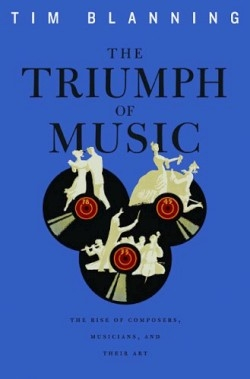The Triumph of Music
The Rise of Composers, Musicians, and their Art
- 2008 INDIES Finalist
- Finalist, Music (Adult Nonfiction)
In the 1960s it seemed as if music were a primal force that could help change the world. Various music festivals embraced the power of music as a means of fostering peace and love and demonstrators at political rallies swayed to music that united sometimes disparate parties in a common cause. What makes music such a powerful force and how can we use its energy to understand our own humanity? How did it rise to take center stage in such a fractious time and is it does it retain such power today? What roles did individual composers and musicians play in elevating music to its new status as the liveliest of all the arts? Blanning’s splendid examination of the evolution of music from the Middle Ages to the twenty-first century attempts to answer these and other questions.
According to Blanning while music always seduced its listeners—from the ancient balladeers whom Plato condemns and Aristotle celebrates—it came into its own as a singular art form in the eighteenth and nineteenth centuries when composers rose to fame in much the same way that rock stars rose to fame in the twentieth century. Blanning examines five ways in which music moves from the periphery of the arts to the center. Drawing on examples ranging from Mozart and Beethoven to Bach and Irish rocker Bono he demonstrates that when the status of the composer and musician changed when music demonstrated a new purpose when new places and spaces celebrated music alone when new technologies allowed musicians to express themselves in new ways music was liberated from the straightjacket in which society had put it and it rose to prominence in several cultures.
Blanning points out the ways that in the early nineteenth century for example perceptions of mu-sic’s purpose had changed. “This period marked a major shift in the way music was regarded. Instead of writing something recognized as ephemeral to be played once or twice and then discarded com-posers aspired to create works that would become a permanent part of the classical repertoire.” By the 1980s he contends music had triumphed so successfully that it could be said that “music is the relig-ion of the people.”
Blanning’s superb book joins several others such as Daniel Levitin’s The World in Six Songs: How the Musical Brain Created Human Nature that explore the tremendous influence of music on human nature and society. Blanning’s study conducts everyone whom music touches on a marvelous journey from music’s earliest roots to its central place in contemporary society.
Disclosure: This article is not an endorsement, but a review. The publisher of this book provided free copies of the book to have their book reviewed by a professional reviewer. No fee was paid by the publisher for this review. Foreword Reviews only recommends books that we love. Foreword Magazine, Inc. is disclosing this in accordance with the Federal Trade Commission’s 16 CFR, Part 255.

